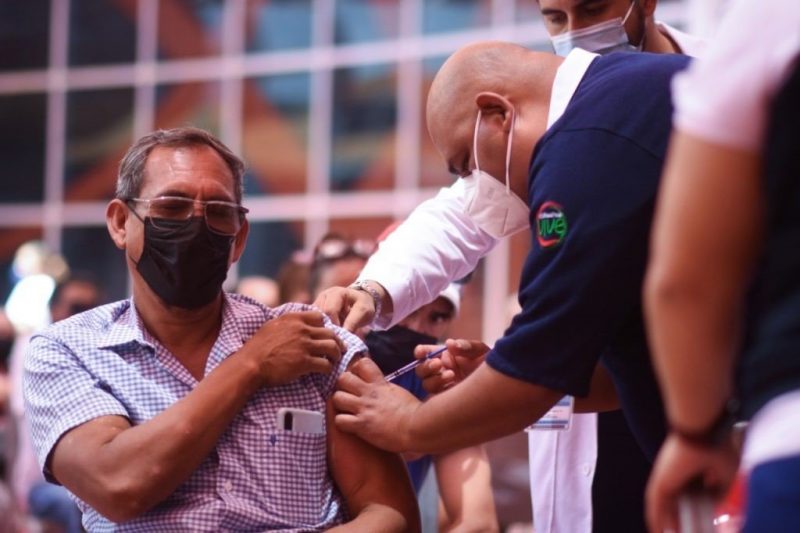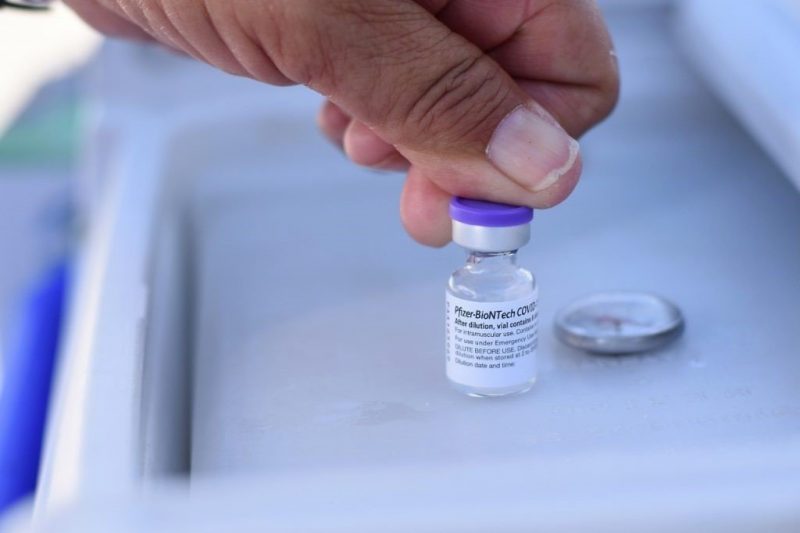By Veronica Martinez/La Verdad
CIUDAD JUÁREZ – Angelica Ruiz crossed the border for her vaccine appointment at the El Paso County Coliseum in February. The Juárez native remembers that it took her less than half an hour to get to the location and be completely vaccinated against COVID-19.

Even though she lives in Juárez, Ruiz is a permanent legal resident of the United States, so the border closing did not affect her and she can move around in both countries.
“I am very much at peace and very happy that we are all vaccinated already,” said Ruiz, whose parents died of COVID-19, “even though I still need the other part to be completely happy.”
If Ruiz, who is 57, would have waited for her turn in Mexico, she would have barely received her first doses by the end of May. Ruiz’s husband and children also received the vaccine against the virus in El Paso.
Like Ruiz’s family, other American residents and citizens who live in Ciudad Juárez also took advantage of their status to cross to the United States and be vaccinated. But the health authorities in El Paso are not keeping records of people from Ciudad Juárez who have benefitted from this.
Health authorities in the state of Chihuahua said it is hard to determine the exact number of residents in Ciudad Juárez who have been vaccinated in El Paso since a large percentage of the population has dual nationality, Mexican and American.
“It was certainly a large amount of people and that helped the people who live in this city and who were immunized before the rest of the population. This leaves vaccines for other people,” said Arturo Valenzuela Zorrilla, medical director of the Secretary of Health in the northern region.

Since the state of Texas does not require residency information to receive the vaccine, the city of El Paso does not track the number of people who live in Ciudad Juárez and who have been vaccinated in El Paso, said Laura Acosta, the city’s spokesperson.
“When you’re in our community and you want a vaccine, you can get vaccinated independently of your status or situation,” El Paso County Judge Ricardo Samaniego said.
Dr. Melba Muniz, executive director of Alianza para Colaboraciones Fronterizas, an association which works with the Paso del Norte Health Foundation, said the two cities have different vaccination processes.
“The people who want to get vaccinated here (in Ciudad Juárez) must register on a list, wait to be called, and stand in line for many hours to be able to get the vaccine,” Muniz said. “On the other hand, it is very easy to do so in El Paso.”
Muniz said that in addition the people on the border whose immigration status allows them to travel through land between both countries, Mexicans with visas or with the financial capacity to pay for a flight have also been able to get vaccinated in the United States.

As of Sunday, almost 490,000 people in El Paso have received at least one vaccine dose and more than 390,000 are fully vaccinated.
In Ciudad Juárez, whose population is twice as large as El Paso, more than 230,000 people had received at least one dose, according to Secretary of Wellbeing.
Travelling by plane to get vaccinated
For Daniela Uribe and her family, residents of Chihuahua City, travelling by plane to Houston, where her oldest sister lives, was the fastest option for all her family to get vaccinated.
The family of four made two international trips with their tourist visas, for which they paid around $650 each.
Uribe asked to be identified by a pseudonym so as to not risk possible visa renewals for her and her family.
“We saw it as an opportunity to visit my sister,” Uribe said. “The other reason was that even though it was almost my dad’s time to get the vaccine, we didn’t know which one he was getting. We were sure he was going to get the vaccine we wanted over there.”
Uribe said that her and her family did not feel safe about the effectiveness of the AstraZeneca vaccine, the first one supplied in Chihuahua, and they would rather receive Pfizer or Moderna. Moreover, 24-year-old Uribe and her 17-year-old sister would still be waiting for their turn because people who are 40 years old are barely being called to get vaccinated.
Even though they are completely vaccinated, Uribe and her family feel that they should still take precautions.
“I am aware that I still have to wear a facemask when I go out,” Uribe said. “It doesn’t matter much anymore, it’s the peace of mind that we are now fine.”
In her home, Uribe feels like everything is back to normal without having to follow the ritual of disinfecting her clothes, shoes, and things they bought in the supermarket.

Going back to normal
For Angelica Ruiz, the transition to live her life like it was before the pandemic has been more difficult, even though she has been completely vaccinated for more than two months.
In November of last year, Ruiz and her family got infected from coronavirus, including her mother and father. Both older adults passed away because of the disease and Ruiz said that “left a mark.”
Ruiz still takes precautions when she goes into supermarkets in El Paso and Juárez and says that she and her husband have only gone out to eat once this year.
“I ask God that I don’t get it again because I don’t know if I’ll make it again,” Ruiz said. “That doesn’t allow me to have that trust again.”
The American resident born in Mexico thinks that it will still take her a long time to “feel in the norm from before.” Even though it gives her some confidence that the majority of the population of El Paso is vaccinated, she wishes more El Pasoans would get vaccinated since they have that option, unlike their neighbors from Juárez.
While the Centers for Disease Control announced that people who are completely vaccinated will not need to wear a facemask, El Paso Mayor Oscar Leeser and County Judge Samaniego encourage the population to maintain precautions and work so that the community reaches a 75 percent immunity.
Samaniego added that Juárez’s population must be considered in order to reach herd immunity.
“We need to show our neighbors in the south that we want them to come here as soon as possible,” Samaniego said. “When we talk about normality, it will not be normal until our relationship with Juárez and Chihuahua returns to how it was before.”
Samaniego said that a spike in spread in one or both border cities would be a factor which would not allow for the opening of the ports of entry after the announcement by the American government saying that non-essential crossing restrictions will continue until June 21.
Mexico’s embassy in the United States and the Secretary of Foreign Affairs announced that both countries are negotiating to make restrictions more flexible on June 22.
“To me, this is an initiative that if we do things right here and in Juárez, there is a possibility for the bridges to open,” Samaniego said.
Cover photo: The Paso del Norte Bridge seen from Ciudad Juárez’s Presidencia Municipal, with New Mexico’s Mount Cristo Rey in the background. (Corrie Boudreaux/El Paso Matters)

